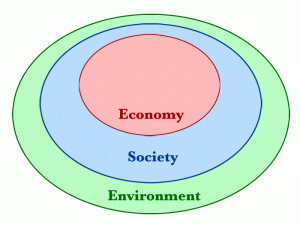Apathy: one of the biggest issues facing the fulfillment of our shared civic responsibility. People don’t think that their vote or their action can make a difference, and thus they don’t utilize their individual power to spark change. That being said, this week’s readings and lectures have caused me to— rightfully so— question the individualistic rhetoric surrounding apathy. The juxtaposition between Michael Pollan’s highly individualistic guide to healthy eating and Michael Maniates’ critical review of American environmental individualism provided me with a much needed wakeup call in terms of how we must approach environmental issues and understand our civic responsibilities. I still believe that individual choices, such as those outlined by Pollan, maintain an important role in large-scale change, but these choses cannot exist in a vacuum. Furthermore, these choices are influenced by privilege, not accessible to those who are hurt the most by global climate change.

Photo by https://commons.wikimedia.org/wiki/File:Rain_droplets.jpg
It seems that we have failed to maintain the delicate balance of using our individual means to make sustainable choices while working to design large-scale societal shifts through systematic changes. People—particularly the world’s wealthiest— are too often making personal environmentally-conscious choices not in effort to empower others to do the same or to inspire institutional change, but in an effort to feel less guilty, or less unsafe, or less culturally inept in our rapidly changing natural world. Despite less perceived apathy towards environmental issues, citizens are still failing to fulfill their civic duty of working towards concrete change in environmental policy and action. True change cannot be done without cross-system collaboration of the individual, the community (i.e. grass-roots organizations), and government institutions. This means that instead of simply choosing to buy your produce at a farmer’s market, consider contacting a government representative to inquire about increasing funding for equitable food programs or work with a local organization that helps bring community farms to food deserts. We must not let individual actions distract us from the greater need for collective action; it is our civic responsibility to work from an intersectional standpoint, considering how different sectors interact to create one sustainable system.

Photo by: https://commons.wikimedia.org/wiki/File:Nested_sustainability-v2.gif
